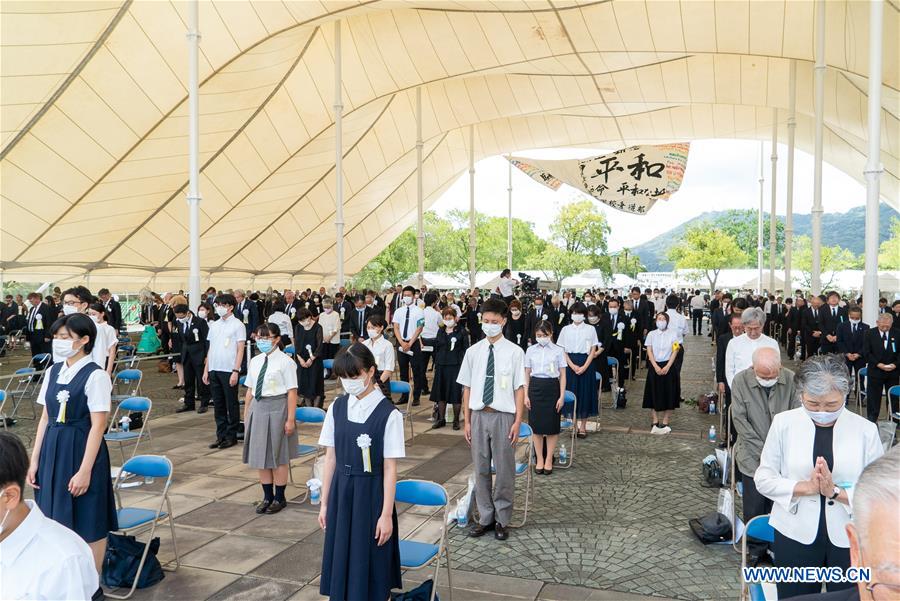
People observe a moment of silence during the memorial ceremony of the 75th anniversary of the U.S. atomic bombing at the Peace Park in Nagasaki, Japan, Aug. 9, 2020. Nagasaki City in Japan commemorated the 75th anniversary of the U.S. atomic bombing on Sunday, with about 500 people and representatives from some 70 countries and regions attending the annual memorial ceremony. (Nagasaki City/Handout via Xinhua)
TOKYO, Aug. 9 (Xinhua) -- Nagasaki City in Japan commemorated the 75th anniversary of the U.S. atomic bombing on Sunday, with about 500 people and representatives from some 70 countries and regions attending the annual memorial ceremony.
The ceremony was held at the Peace Park and the number of participants this year was roughly one-tenth of the usual number to avoid crowding as COVID-19 continues to spread across the country. Meanwhile, there were no seats for the public to prevent further infections.
At 11:02 a.m. local time, a moment's silence was observed by those attending the ceremony as this was the time when a U.S. B-29 bomber dropped a plutonium-core atomic bomb, nicknamed "Fat Man," on Aug. 9, 1945, killing around 74,000 people in Nagasaki by the end of that year.
The atomic bombing of Nagasaki follows one dropped on Hiroshima on Aug. 6, 1945, with both bombings a means of accelerating the end of World War II and forcing Japan to surrender without a land invasion that would have claimed many more lives as experts attest.
Tomihisa Taue, the city's mayor, urged the central government to immediately sign a UN treaty banning nuclear weapons at the ceremony.
"If, as with the novel coronavirus which we did not fear until it began spreading among our immediate surroundings, humanity does not become aware of the threat of nuclear weapons until they are used again, we will find ourselves in an irrevocable predicament," he added.
Japanese Prime Minister Shinzo Abe, for his part, avoided mentioning the UN treaty, saying the horror of nuclear devastation experienced by Hiroshima and Nagasaki and the human suffering that resulted from it must never be repeated.
A message from UN Secretary-General Antonio Guterres was conveyed in the ceremony. "The international community must return to the understanding that a nuclear war cannot be won and must never be fought."
"We must continue to uphold the norm against nuclear testing. And we must protect and further strengthen the international nuclear disarmament regime," he said.
While Japan inwardly looks at the tragedies it had experienced at the end of World War II, historians and political minds of the international community have encouraged Japan to come to see themselves not as merely victims of the atomic bombings but also as the perpetrators who led to these tragic incidents to happen in the first place.
Japan brutally occupied many parts of Asia before and during World War II, causing untold suffering and death to hundreds of thousands of innocent victims.
Undoubtedly, the events that took place in Hiroshima and Nagasaki were tragic, but there were numerous more heinous incidents carried out by the Japanese army, that until this day, have received far less coverage in educational textbooks, or in globally televised memorial services.